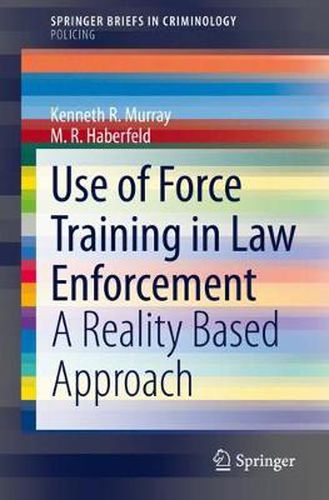Readings Newsletter
Become a Readings Member to make your shopping experience even easier.
Sign in or sign up for free!
You’re not far away from qualifying for FREE standard shipping within Australia
You’ve qualified for FREE standard shipping within Australia
The cart is loading…






This title is printed to order. This book may have been self-published. If so, we cannot guarantee the quality of the content. In the main most books will have gone through the editing process however some may not. We therefore suggest that you be aware of this before ordering this book. If in doubt check either the author or publisher’s details as we are unable to accept any returns unless they are faulty. Please contact us if you have any questions.
This Brief describes a reality based approach to use-of-force training in law enforcement, an area of growing importance. It explains what scenario-based training is, how it works to improve police-community relations, and provides a guide for how the training can be implemented. This brief will be of value to researchers working to understand the negative impact of use of force on police-community relations, and interested in alternative approaches that integrate academic research with tactical experience.
The traditional use-of-force training paradigm is based on relatively brief training sessions with high student-to-instructor ratios. In scenario-based training, officers listen to social science-based lectures, develop a set of scenarios to be tested in a training environment, and conclude with a debriefing session that brings together the theoretical with the practical, including the consequences of the shooting from the tactical, emotional, psychological, social, and economic angles. This work will be of interest to researchers in criminology, criminal justice, sociology, psychology and related fields, policy-makers, particularly with interest in police legitimacy and police-community relations, as well as practitioners in police organization and training.
$9.00 standard shipping within Australia
FREE standard shipping within Australia for orders over $100.00
Express & International shipping calculated at checkout
This title is printed to order. This book may have been self-published. If so, we cannot guarantee the quality of the content. In the main most books will have gone through the editing process however some may not. We therefore suggest that you be aware of this before ordering this book. If in doubt check either the author or publisher’s details as we are unable to accept any returns unless they are faulty. Please contact us if you have any questions.
This Brief describes a reality based approach to use-of-force training in law enforcement, an area of growing importance. It explains what scenario-based training is, how it works to improve police-community relations, and provides a guide for how the training can be implemented. This brief will be of value to researchers working to understand the negative impact of use of force on police-community relations, and interested in alternative approaches that integrate academic research with tactical experience.
The traditional use-of-force training paradigm is based on relatively brief training sessions with high student-to-instructor ratios. In scenario-based training, officers listen to social science-based lectures, develop a set of scenarios to be tested in a training environment, and conclude with a debriefing session that brings together the theoretical with the practical, including the consequences of the shooting from the tactical, emotional, psychological, social, and economic angles. This work will be of interest to researchers in criminology, criminal justice, sociology, psychology and related fields, policy-makers, particularly with interest in police legitimacy and police-community relations, as well as practitioners in police organization and training.